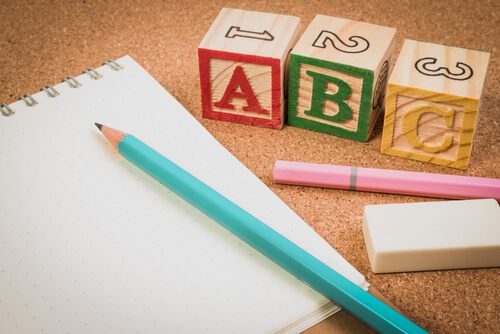Egocentric Stage in Children: Danger!

Egocentrism can manifest at an early age. It is all too common for children to refuse to share with others or consider their feelings. But how should parents react to an egocentric stage in children?
What is egocentrism in children?
When we say that an adult is egocentric, this means that they think only about themselves. They don’t care what others think or feel.
In children, egocentrism is slightly different. The fact that a child is going through an egocentric stage doesn’t mean that they will grow up to be selfish adults. This is just a stage of their development.
At this stage, children want to be at the center of attention. They have not yet developed what we call empathetic thinking.
In fact, all children go through this phase to some extent. It is normal and healthy, and parents should not worry too much about it. What they need to do is be patient and give their little one plenty of affection.
Phases of the egocentric stage in children
“The three diseases of a modern man are non-communication, technological revolution and its life centered on its personal triumph”
-José Saramago (1922-2010)
Saramago’s saying reflects how harmful it can be to give egotism a free rein, in adults or children. For this reason, it is vital for parents to know how to act when children are going through an egocentric stage. This starts with knowing the phases of this stage:
Phase of discovery
During this phase, the child is learning from everything around them. If they notice selfish behavior, they will imitate it. For this reason, it is important to teach your child to share. Lead by example.
Phase of relationship development
This is when attachment and friendships develop in children. According to the psychologist Paul-Alexandre Osterrieth, up to 5 years of age, children do not feel the need to share things with others, because when they play together they do not have a common goal in mind.
However, between 6 and 7 years of age, the child begins to understand the meaning of cooperation. This means they are able to share with others, developing relationships.
Phase of acceptance
During this phase, the child should show signs of having learned appropriate social skills. These abilities and behaviors are learned through instruction, imitation, preparation and practice. This is what all parents should aim to achieve with their children.
When does the egocentric stage begin in children?
When do children become egocentric? This question may be on the minds of many parents.
According to many studies, the egocentric stage in children appears from 2 or 3 years of age. This is because, in human nature, everyone tends to be egocentric.
However, developing social skills through education and good parenting can change this.

From an early age, children feel they are at the center of their world. This makes it difficult for them to put themselves in other people’s shoes.
Children at this age are not able to show empathy, because they don’t understand that those around them are people too, with opinions and needs of their own.
Manifestations of egocentrism in children
The egocentric stage in children is often characterized by frequent tantrums. This is due to a lack of understanding in little ones, which often leads to frustration.
Tantrums, screams and insults are how children try to get what they want. It is important to help them at this stage, or they could turn into an all-too-common event.
How to act during the egocentric stage in children
Parents should be positive. Take into account that it is possible to change children’s behavior with constant encouragement to do the right thing. But how can we do this?
If your child has a tantrum for egocentric reasons, don’t give them what they want to calm them down. Don’t try to distract them with something else, either.
Ideally, you should stay calm and tell them in as few words as possible what they should do.
After the tantrum has passed, explain to the child what you expect from them next time. For this to work, a calm and serene atmosphere at home is essential.
Your child won’t learn not to scream for what they want if other members of the family do it all the time.
The link with language acquisition
The egocentric stage in children begins to fade with the development of language. This usually occurs at around 4 years of age.
The reason for this is that language allows children to socialize with others, and therefore to understand other points of view. This leads to increasing maturity and understanding.

Use encouragement, not force
Encouragement, not force, should be the motto for parents teaching their children to share. Children pick up the behavior and attitudes of their parents. One thing they should learn is that other people exist and have their own needs.
It is key, therefore, to ensure that your child understands that sharing with others can be enjoyable and interesting. This is something that they will learn primarily from your example.
Don’t obligate them
Parents should not force their children give up their toys and possessions if they don’t want to. Instead, teach them that sharing is the right thing to do.
Teaching them to do something is different than making them do something. Don’t make fun of their selfish behavior, either. If you do this, the child will feel even more isolated and misunderstood.
These are just a few pointers for how to react to an egocentric stage in children. The important thing is to keep in mind that children learn by example, whether good or bad. This is something that parents shouldn’t take for granted.
All cited sources were thoroughly reviewed by our team to ensure their quality, reliability, currency, and validity. The bibliography of this article was considered reliable and of academic or scientific accuracy.
- Falvel, J. H. (1985): La psicología evolutiva de Jean Piaget. Paidós. Buenos Aires.
- Gutiérrez, M. D. M. E. (2008). El egocentrismo del niño. Sumario General Página, 13, 37. https://www.researchgate.net/profile/Valentin_Catalan/publication/39252696_Educacion_para_la_salud_la_alimentacion/links/53f490740cf2fceacc6e8d93.pdf#page=37
- Martínez Rubio, V., Obrero García, J.A. y Plaza López., J. (1992). El componente de egocentrismo en los niños de 4 años. Departamento de Psicología. Universidad Jaime I.
- Vigotsky, L. (1989): Desarrollo de los procesos psicológicos superiores. Grijalbo. Barcelona.
This text is provided for informational purposes only and does not replace consultation with a professional. If in doubt, consult your specialist.








